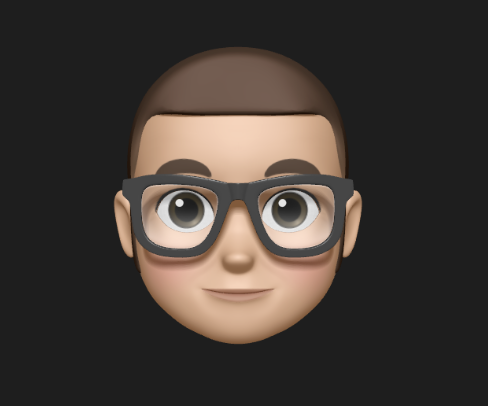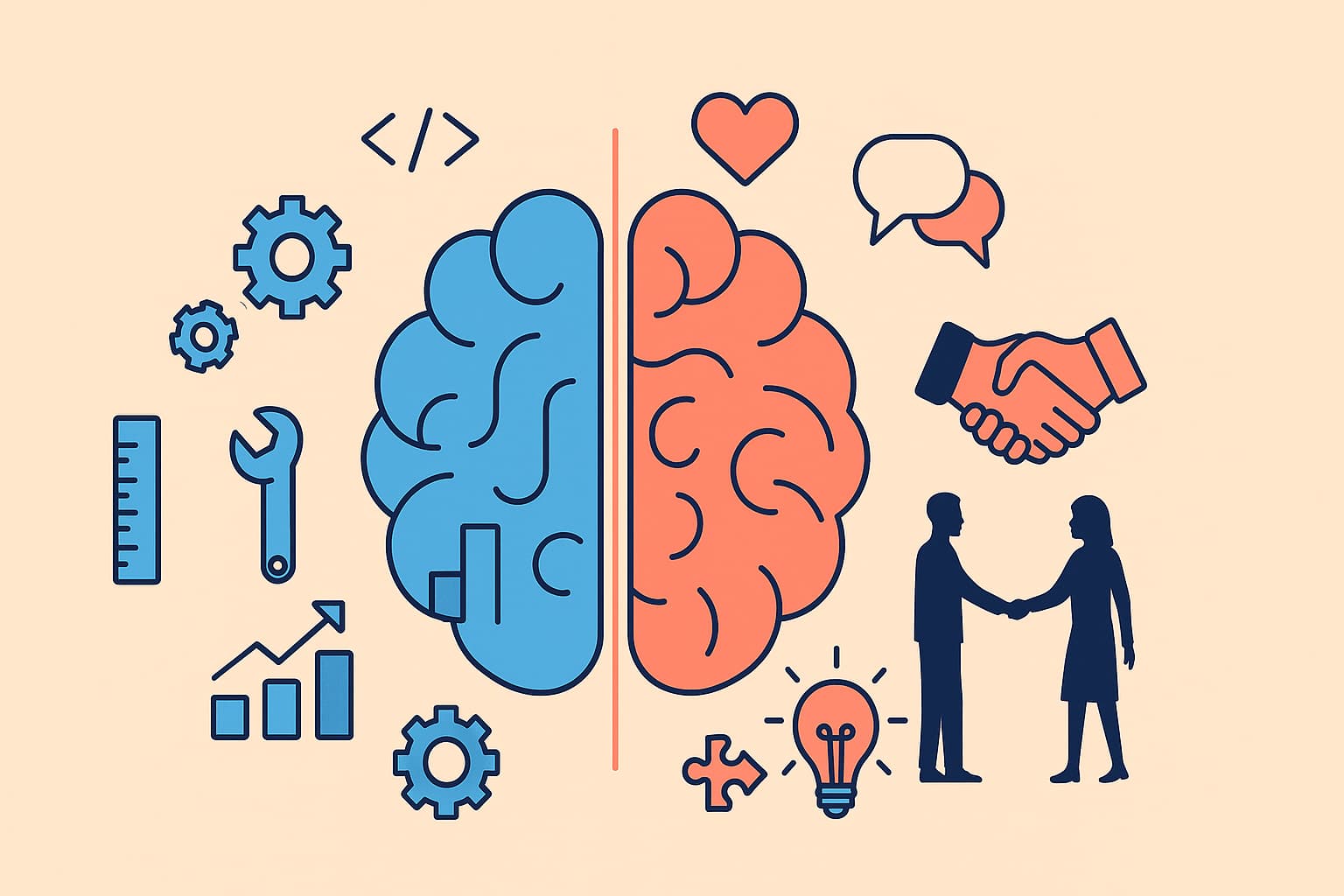 Freelancer tips
Freelancer tips Process Operations Diagram: What It Is and How to Make One
The process operations diagram helps organize tasks, improve productivity, and support better decision-making. Learn how to create one here.



Soft and hard skills encompass the set of abilities that determine how a person works, communicates, and solves problems.
But what are soft and hard skills?
The former are interpersonal and emotional qualities, and the latter relate to technical ability and mastery of specific tools.
Developing both is essential in today’s job market to stand out as a professional. They don’t just show your ability to execute tasks; they also prove you can collaborate, adapt, and lead effectively.
Not sure how to tell soft skills from hard skills?
In this post, we explain the differences between soft and hard skills, along with examples and tips to develop them.
Soft skills are social and emotional traits that help you relate and communicate well, while hard skills are technical knowledge you can measure or demonstrate.
In today’s job market, both are essential for professional success and are valued equally.
Hard skills, on the one hand, are necessary to perform a particular function. Soft skills, on the other, enable you to integrate effectively with others.
Soft and hard skills differ in their nature and how they’re acquired or evaluated.
Below is a basic comparison between soft skills vs. hard skills:
Hard Skills | Soft Skills | |
How they’re acquired | Through formal education, courses, certifications, or experience. | Through personal experience, social interaction, and emotional development. |
How they’re measured | Quantifiable and verifiable with tests, degrees, or concrete results. | Qualitative and assessed via observation, interviews, or team performance. |
Common examples | Programming, design, accounting, languages. | Effective communication, empathy, adaptability, critical thinking. |
Relevance | Determine technical ability to perform specific tasks in a field. | Promote collaboration, leadership, and problem-solving in any work environment. |
Suppose you’re a graphic designer.
So, you need to have hard skills to, for example, master specialized software and adapt to using tools for remote work. But you also need soft skills to understand client needs, communicate effectively, and collaborate as a team.
If you still can’t tell these skills apart, here are some concrete examples.
These include competencies that foster teamwork, conflict resolution, and the ability to adapt to new challenges:
Empathy. Leadership. Responsibility. Attention to detail. Emotional intelligence. Adaptability. Creativity. Patience. Organization. | Resilience. Critical thinking. Teamwork. Innovation. Flexibility. Time management. Conflict resolution. Negotiation. Decision-making ability. |
These are measurable and demonstrate your technical capacity to carry out precise tasks as a professional. While they vary by profession, here are some of the most common:
Proficiency in one or more languages. Data analysis. Risk analysis. Graphic or UX/UI design. Digital marketing. User research. Network security. Sales and CRM. Information science. Audiovisual production. | Proficiency with professional software. Programming and web development. Accounting and finance. Database management. Writing and editing. Project management. Market research. Cybersecurity knowledge. Programming languages. Office software tools (Excel, Word, PowerPoint). |
But how do you highlight both on your résumé?
Ideally, keep a balance—mention your technical competencies alongside the personal qualities that strengthen your performance.
The key is to be honest: include the professional skills you truly master and back them up with achievements or experience.
You can develop soft and hard skills at the same time, but it takes time and dedication. First, conduct a self-assessment to determine what you already master, what you need to improve, or what you need to learn.
Once you have your list, consider these tips:
They’re usually strengthened through practice and daily interaction, for example:
Participating in workshops or courses on communication, leadership, or emotional intelligence
Fostering self-knowledge through reading, reflection, or personal development exercises
Practicing Deep Work to promote deep concentration and intentional productivity
Requesting constant feedback to spot progress and areas for improvement
Maintaining a continuous-learning mindset to solidify interpersonal relationships
Practicing active listening and empathy in 1:1 meetings or any space that fosters connection and mutual understanding
As noted, these skills are developed through training and professional practice, and you can boost them by:
Taking courses, diplomas, or certifications related to your field
Attending specialized workshops or seminars to stay current
Keeping up with new technologies and sector trends
Seeking opportunities to put what you’ve learned into practice
Regularly evaluating your progress to measure technical growth
Some soft and hard skills require more consistency and commitment than others. Move step by step, learning from practice and your environment.
Soft skills are key to creating healthy environments where ideas flow. They also improve job performance and contribute to organizational results, according to PMC analyses.
Hard skills are just as important, ensuring you have the technical capacity needed to achieve operational goals. They’re also more important than ever in the hiring process.
These types of professional skills form the balance every organization seeks—technically competent professionals who are also human, collaborative, and adaptable.
That’s why companies recognize that success depends on those who can combine both dimensions. In fact, research suggests they shouldn’t be seen as opposites, but as parts of the same system.
Developing both technical and interpersonal skills is essential to stand out in today’s workplace. The former let you execute tasks precisely and meet market demands; the latter amplify collaboration, adaptability, and leadership.
That balance drives individual professional growth—while strengthening organizational culture, a company’s capacity for innovation, and the decision-making process.
Therefore, investing time in honing these competencies is a smart strategy to avoid going unnoticed in the job market. Meanwhile, DolarApp is a helpful ally to simplify your finances across currencies.
DolarApp is a reliable alternative for sending and receiving digital dollars or digital euros. We charge only 3 USDC or EURc per transaction, regardless of the amount.
We also offer a competitive exchange rate to convert from one currency to another.
Soft skills are social qualities associated with emotional intelligence. Hard skills, on the other hand, are technical knowledge you learn over time and can measure.
Because soft skills facilitate collaboration and adaptability, while hard skills ensure technical capability. Together, they enable problem-solving, sound decision-making, and value creation in any work environment.
Soft skills include communication, empathy, creativity, leadership, critical thinking, and conflict resolution. Hard skills include software proficiency, design, data analysis, programming languages, accounting, and digital marketing.
Through continuous learning, certifications, mentoring, and personal development practices. Also via self-assessment, feedback, and work experiences that strengthen both your technical and interpersonal abilities.
Sources:
Soft and hard skills within a common framework

The world has borders. Your finances don’t have to.
 Freelancer tips
Freelancer tips The process operations diagram helps organize tasks, improve productivity, and support better decision-making. Learn how to create one here.

 Freelancer tips
Freelancer tips A business brings new challenges and decisions as it scales. Learn the stages of business growth and identify which stage you’re in.

 Freelancer tips
Freelancer tips A well-written privacy policy makes users trust your site more. Here are the necessary elements and a practical example to create one.


